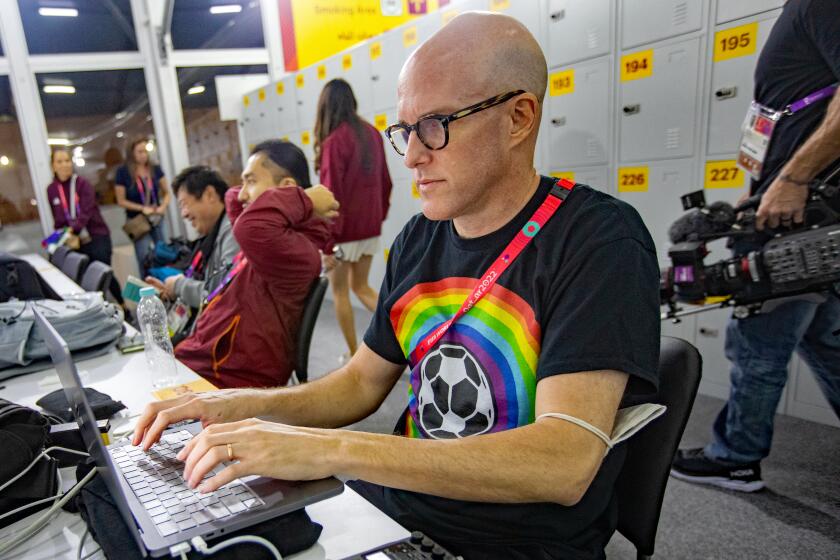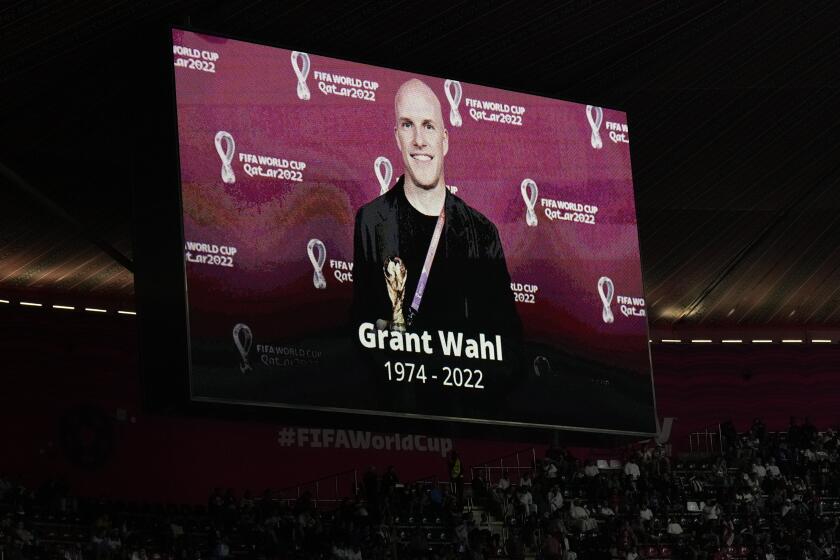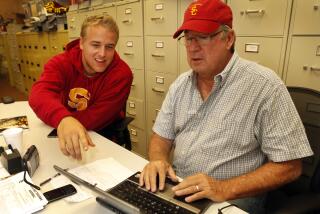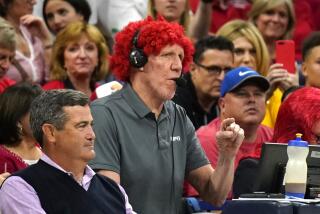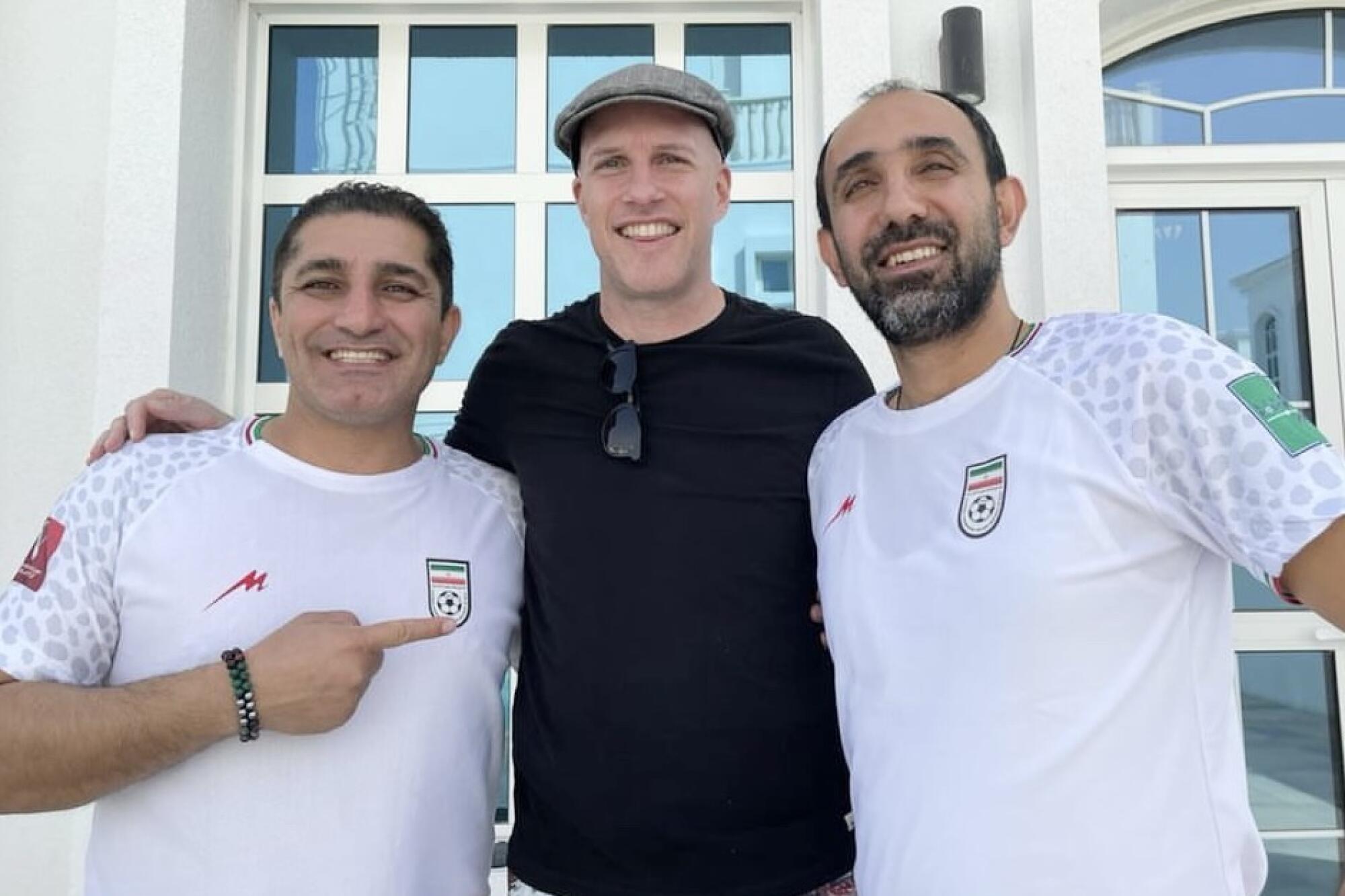
- Share via
Grant Wahl could throw a dinner party. He and his wife, Dr. Céline Gounder, hosted them monthly for Grant’s Sports Illustrated colleagues. The idea wasn’t to bring together a collection of the familiar, but to gather a group of co-workers who might know little about the others, if they knew anything at all. The invite list offered no deference to one’s place on the masthead; in fact, it was deliberately anti-hierarchal, designed to confirm to the freshly-hired web producer that they were every bit the VIP that the most senior editor was, maybe more so. Grant cooked, Celine chose the wine and the two of them made everyone in the room feel like the president of France.
From the late spring day in 1996 that Wahl walked into Sports Illustrated HQ, he relentlessly championed inclusion and his colleagues, especially younger ones and those further removed from the levers of corporate governance. Wahl, who died early Saturday morning after collapsing in the press center at the men’s World Cup in Qatar, had turned down a staff writer position at the Miami Herald to be an SI fact checker. He was gregarious and ambitious. He had swagger, too, and a healthy skepticism about the entrenched institutional hierarchy that defined not just Sports Illustrated, but Big Media more generally, in those days. He took on any assignment, no matter how dutiful or unglamorous, but he expected to be rewarded with the green light for his most ambitious story proposals, not for them not to be redirected to a more senior staffer. By the time he turned 25, this cover story launched a portfolio that would grow to more than 75 cover stories. By his 28th birthday, he had added this all-timer, which still resonates through the decades for the story’s famous subject. He was that good.
His lodestars then were Alex Wolff, the Hall of Fame writer whom Wahl succeeded on the college basketball beat, and Jon Wertheim, his closest friend at SI and frequent collaborator. All three moved effortlessly across sport and subject, had built small anthologies of “bonus pieces” — the signature, probing longform pieces at the end of every magazine issue — and had a wanderlust that regularly sent them across oceans and hemispheres. Not long after covering the 2009 NCAA men’s basketball championship, and ahead of the 2010 men’s World Cup in South Africa, Wahl trained his ambition on a more narrow, and risky, path: soccer and soccer only.
Grant Wahl, a soccer writer who covered U.S. soccer in the past for Sports Illustrated and Fox Sports, died after collapsing while covering a World Cup match.
It wasn’t an easy sell. With the assistance of his editors, Mark Mravic and Adam Duerson, and fellow soccer writer George Dohrmann, Wahl convinced SI’s editor-in-chief, Terry McDonnell, to take the leap and invest, steeply, in a sport that had been routinely dismissed by SI (and countless others). The company’s most revered alum, Frank Deford, occasionally used his considerable NPR and SI platforms to query what all the fuss was about (which drove Wahl mad). Over the next decade, however, Wahl became the definitive chronicler of the sport in North America, a world traveler who applied rigor, depth and passion, without being pedantic or precious, to his coverage. He visited six of the seven continents several times over, introduced the world to a generation of U.S. women rock stars (Morgan, Rapinoe, Wambach), coaxed private audiences out of some of the planet’s most reclusive stars (Messi, Ronaldo, Balotelli) and led a life of globe-trotting freedom, adventure and pleasure that was Bourdain-like. Like Bourdain, he had the gift of converting the incurious, or at least getting them to sit up and take respectful notice. That Real Madrid, LAFC or Portland Thorns jersey you see your 13-year-old neighbor rocking? There’s a line you can trace from Grant Wahl to that purchase.
It was a good life, “winning the career lottery” as he once described it to me, but the sport isn’t all Ted Lasso, far from it. International soccer is famously rife with corruption and inequity, and sometimes it’s just plain dangerous, even life-threatening. He doggedly advocated for pay equity for the more successful U.S. women’s national team and refused to turn a blind eye to the government-sanctioned homophobia of the 2022 World Cup host country, where he was briefly detained by security for wearing a rainbow shirt in support of the LGBTQ+ community. He was later released with an apology from FIFA, the same organization whose presidency he had run for in a more-serious-than-you-think candidacy in 2011. In Doha, he wrote a scathing indictment of the Qatari World Cup organizers for their indifference toward the migrant laborers on whose backs the event had been erected. His lead was spare and ruthless: “They just don’t care.”
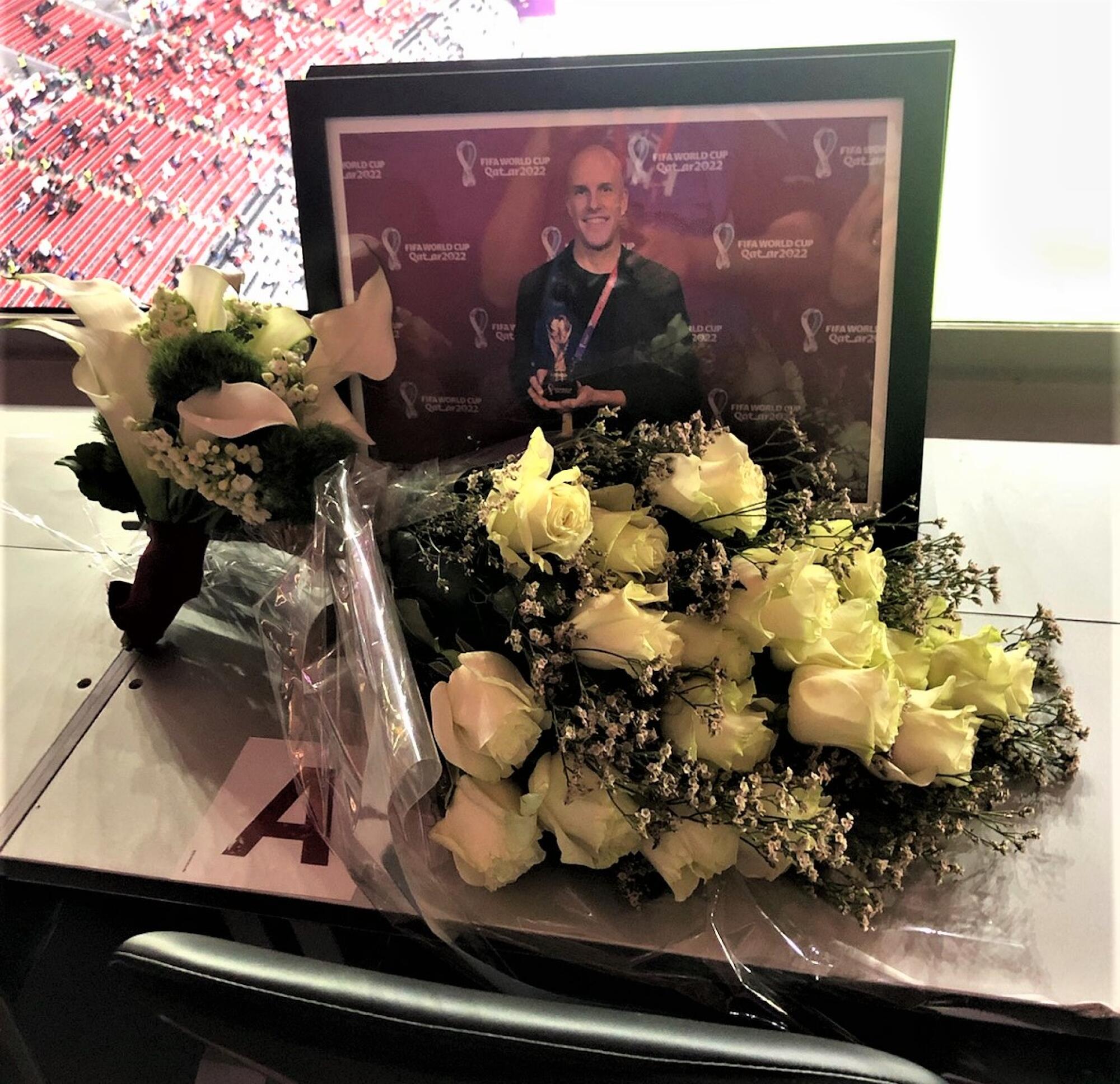
He wrote those words in the midst of an escalating illness. He had fallen ill shortly after arriving in Qatar in mid-November, first developing cold-like symptoms that curdled into something more ominous in the first days of December. “Three weeks of little sleep, high stress and lots of work can do that to you,” he wrote on Dec. 5. “What had been a cold over the last 10 days turned into something more severe on the night of the USA-Netherlands, and I could feel my upper chest take on a new level of pressure and discomfort. I didn’t have Covid (I test regularly here), but I went into the medical clinic at the main media center today, and they said I probably have bronchitis. They gave me a course of antibiotics and some heavy-duty cough syrup, and I’m already feeling a bit better just a few hours later. But still: No bueno.”
Four days later he was gone. Even to those who understand Wahl’s impact best, the outpouring of love and paeans in the wake of his death left them stunned, and awed. Mravic, his old SI editor, stayed up deep into Friday night, scrolling through Twitter and drawing comfort from the volume and breadth of the tributes. “The world, literally, is having a conversation about the impact of Grant Wahl,” he said on Saturday night.
FIFA honored prominent soccer journalist Grant Wahl during the England-France World Cup match, joining a wave of tributes to Wahl following his death.
It’s one thing to lead a life that is the envy of your massive audience (Wahl has more than 850,000 Twitter followers). It’s another thing to share that life so generously with that massive audience. (Again, the Bourdain parallel.) Wahl loved the company of futbol-loving strangers, often over beers at Nevada Smith’s in Manhattan’s East Village, and a Twitter notification of his presence in a foreign pub could draw a huge pop-up audience. He was even kinder to his co-workers, tirelessly drawing attention to their work, especially that of a talented video team that produced the project I believe he was he most proud of: “Exploring Planet Futbol,” a four-episode documentary series that took him to the nether corners of Iceland, Argentina, Germany and Japan ahead of the 2018 World Cup. He opened his home to — and picked up the sushi bill for — anxious, angry co-workers in the wake of mass layoffs at Sports Illustrated in the fall of 2019. Even during the darkest, most uncertain days of the pandemic, he connected anyone who asked to Céline, an epidemiologist who would later serve on the Biden transition team’s COVID-19 task force. In at least one case, it might have made a life-saving difference.
He was the most inclusive colleague I have worked with in three decades in the media business, and that gift was the one most cited in the thousands of remembrances that made social media something less of its usual hellfire this weekend. He opened literal doors (to his office, to his wife’s, to his kitchen table) and figurative ones (to the giant professional life he led). Among the most moving tributes I read came from Samara Kelly, who belonged to the aforementioned band of young, gifted Sports Illustrated filmmakers to whom Wahl had become especially close toward the end of his 25-year SI stint. Kelly first met Wahl in Barcelona for a 2016 Lionel Messi interview, a project months in the planning and negotiation. A lot of rarefied air for one room, but Kelly recalls being more aware of the vibe cast by the famous journalist than the soccer icon.
“The world, literally, is having a conversation about the impact of Grant Wahl.”
— Mark Mravic, Wahl’s former editor at Sports Illustrated
“He pushed all the boundaries on that trip getting me access to interviews with the man who signed baby Messi to Barcelona on a cocktail napkin, the president of FC Barcelona, got me access to film a practice with Messi and did it all while helping slug camera gear around the city with a smile,” Kelly wrote on Facebook. “On that trip we shared stories, laughs, career highs and lows. We met in Barcelona as strangers who worked for the same company and left as colleagues, friends.
“As good as a writer as he was, I think his best professional quality was opening and holding the metaphorical door to everyone in the industry. He genuinely wanted to see everyone succeed and would lend a kind word, piece of advice or contact to anyone who needed it. That is the legacy he will leave behind. So, pretty please, be like Grant. Hold the literal and metaphorical door open for everyone you come across.”
He was 49 years old. He was just getting started.
Christian Stone was a Sports Illustrated colleague of Grant Wahl for 23 years.
More to Read
Go beyond the scoreboard
Get the latest on L.A.'s teams in the daily Sports Report newsletter.
You may occasionally receive promotional content from the Los Angeles Times.
